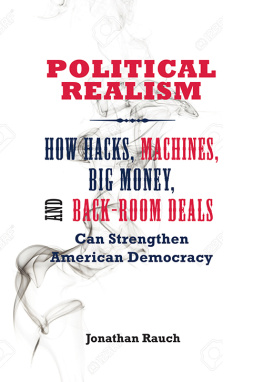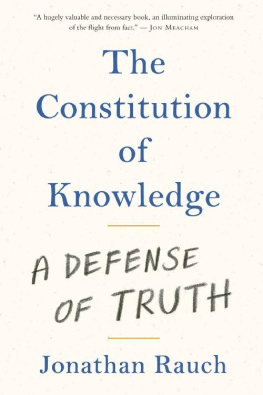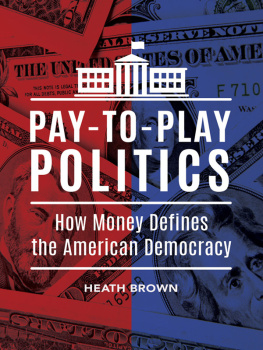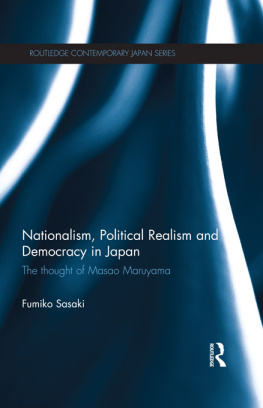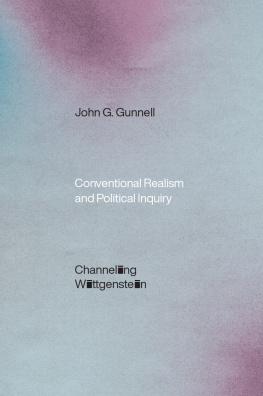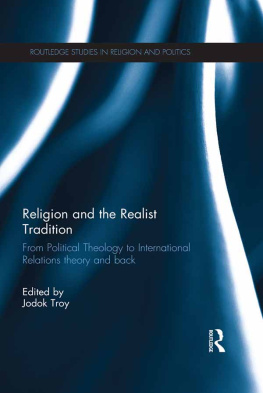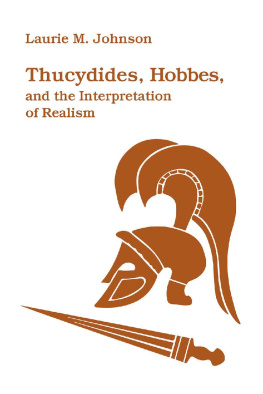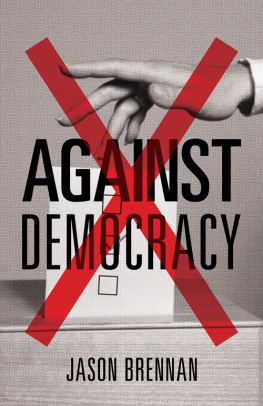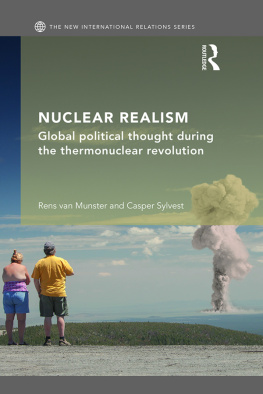P OLITICAL R EALISM
I n December of 2014, progressives and Tea Partiers found common groundnot something that happens every day. Congressional leaders had attached to an omnibus spending bill a rider increasing by a factor of almost ten the amount that individuals could donate to the national parties for conventions and certain other purposes. Progressives denounced the measure as among the most corrupting campaign finance provisions ever enacted, a gift to special interests and plutocrats. For quite different reasons, it seems, these two antagonistic factions managed to agree that the flow of money to party professionals is a menace.
It was a small but telling instance of one of Americas oddest but most consequential political phenomena: the continuous and systematic onslaught against political machines and insiders by progressivism, populism, and libertarianismthree very different political reform movements which nonetheless all regard transactional politics as at best a necessary evil and more often as corrupt and illegitimate. This attack, though well intentioned, has badly damaged the countrys governability, a predictable result (and one accurately predicted more than fifty years ago). Fortunately, much of the damage can be undone by rediscovering political realism.
The politicos of our grandparents generation did a pretty good job of governing the country, despite living in a world of bosses and back rooms and unlimited donations, and many of them understood some home truths which todays political reformers have too often overlooked or suppressed. In particular, they understood that transactional politicsthe everyday give-and-take of dickering and compromiseis the essential work of governing and that government, and thus democracy, wont work if leaders cant make deals and make them stick. They would have looked with bafflement and dismay upon a world where even deals that command majority support within both political partiessomething as basic as keeping the government or the Homeland Security Department openset off intraparty confrontations and governmental crises instead of being worked out among responsible adults. Not being fools or crooks, they understood that much of what politicians do to bring order from chaos, like buying support with post offices and bridges, looks unappealing in isolation and up close, but they saw that the alternatives were worse. In other words, they were realists.
Today, a growing number of scholars and practitioners are bringing new sophistication to our grandparents realism. Though they use diverse approaches and vocabularies, they can be meaningfully regarded as an emerging school, one characterized by respect for grubby but indispensable transactional politics and by skepticism toward purism, amateurism, and idealistic political reforms. This essay builds on their work. In particular, it argues that
government cannot govern unless political machines or something like them exist and work, because machines are uniquely willing and able to negotiate compromises and make them stick.
progressive, populist, and libertarian reformers have joined forces to wage a decades-long war against machine politics by weakening political insiders control of money, nominations, negotiations, and other essential tools of political leadership.
reformers fixations on corruption and participation, although perhaps appropriate a long time ago, have become destabilizing and counterproductive, contributing to the rise of privatized pseudo-machines that make governing more difficult and politics less accountable.
although no one wants to or could bring back the likes of Tammany Hall, much can be done to restore a more sensible balance by removing impediments which reforms have placed in the way of transactional politics and machine-building.
political realism, while coming in many flavors, is emerging as a coherent school of analysis and offers new directions for a reform conversation which has run aground on outdated and unrealistic assumptions.
And where better to begin than with Tammany Hall?
Origins: J. Q. Wilsons Prophetic Critique of Amateurism
What Im calling political realism (and will define more specifically in the next section) has roots as deep as Aristotle, Thucydides, and Machiavelli. In more modern times, it found a colorful exponent in the person of George Washington Plunkitt (18421924), a Tammany Hall functionary who held forth on the virtues of patronage employment (at one point he simultaneously held four government jobs, drawing salaries for three of them) and honest graft, by which he meant insider deals rewarding political loyalists and which he distinguished from purely personal corruption. The looter goes in for himself alone without considerin his organization or his city, Plunkitt said. The politician looks after his own interests, the organizations interests, and the citys interests all at the same time. Reformers who ignored the distinction and tried to stamp out honest graft, he believed, courted anarchy. First, this great and glorious country was built up by political parties; second, parties cant hold together if their workers dont get the offices when they win; third, if the parties go to pieces, the government they built up must go to pieces, too; fourth, then therell be h to pay.
Plunkitt, of course, lost the argument about patronage jobs; the civil service was professionalized, and we are all glad of it. In the twentieth century, politicians found ways to do business without recourse to no-show jobs, featherbedding, kickbacks, and insider dealing. But Plunkitt remains relevant: he reminds us that governments, or at least well-functioning governments, rely not merely on formal legal mechanisms but also on informal political structures and intricate systems of incentives. No informal structures and incentives? No governance.
For all his charm, Plunkitt lacked the sophistication of James Q. Wilson, whose 1962 book, The Amateur Democrat, eminently deserves rediscovery today. Wilson, then beginning a great career in political science, looked in detail at power struggles involving Democratic Party political clubs in New York, Chicago, and Los Angeles. The book is a masterpiece of qualitative research, and I wont attempt to do justice to its fine-textured rendering of mid-century American micro-politics. It is also, however, rich with observations and insights which are as pertinent today as when they were first published and which are foundational to my understanding of political realism.
Wilson mapped conflicts between what he called amateurs (today we might call them activists) and political professionals (todays political class) over control of local political organizations. The two groups despised each other, despite being nominally on the same side (all Democrats). A keen antipathy inevitably develops between the new and the conventional politicians. The former accuse the latter of being at best hacks and organization men and at worst bosses and machine leaders. The latter retort by describing the former as dilettantes, crackpots, outsiders, and hypocritical do-gooders.
Like Plunkitt, Wilson sees parties, incentive structures, and political hierarchies as essential not just to electioneering but also to governing. Parties, he says, have at least three functions in democratic government: they recruit candidates, mobilize voters, and assemble power within the formal government. He emphasizes the importance of the last function: If legal power is badly fragmented among many independent elective officials and widely decentralized among many levels of government, the need for informal methods of assembling power becomes great. Tension between professionals and amateurs inevitably arises because all three party functions will in some degree be performed differently by amateur as contrasted to professional politicians.

